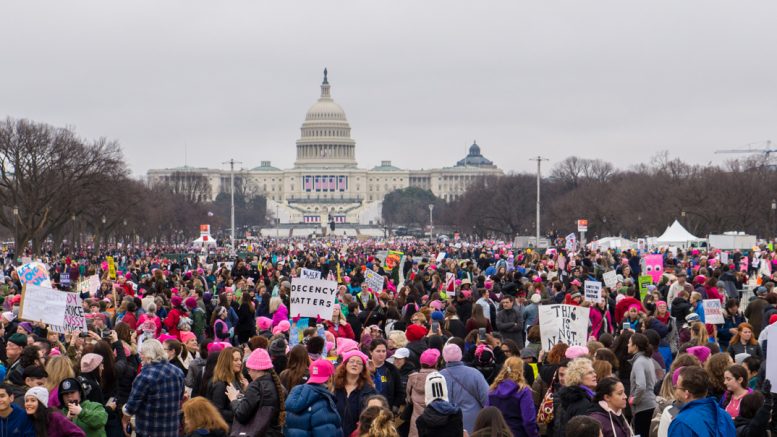Hey guys, gals and everyone else out there, it’s Riley and Calvin here to interview some members of the Friends’ Central community who attended the Women’s March. If you don’t know, the Women’s March was an event where people of all ages, genders, and ethnicities gathered to protest many issues, but mainly women’s rights and president Trump. Millions of people attended these marches all across the world and there was even a march in Antarctica. So today, we share interviews of some people from the FCS community who attended the march.
Interview #1: Mrs. Quinn
Q: So, what’s your name?
A: Alexa Quinn
Q: Who did you vote for?
A: I’d prefer not to say.
Q: Why were you at the Women’s March?
A: Because I felt that it was important to stand alongside other women to give voice to our concerns about being treated equally, paid equally, and respected equally.
Q: Did you have a sign? If so, what did the sign say?
A: I did not have a sign, but I had a t-shirt from 1992–the first time I marched in Washington–that said, “Marching forward for women’s rights. We won’t go back.”
Q: How long did you stay?
A: I stayed until about 1 o’clock.
Q: Did you hear any of the speeches? If so, which one was your favorite speech?
A: My favorite speech was when Donna Bullock, a state representative for District 195, spoke because her message was about making feminism more inclusive. She said it saddened her that some people did not feel included by the Women’s March and emphasized the importance of all people–from different walks of life, races, sexual orientations, genders, physical abilities, and religions feeling like they could be a part of the community at the march and in general.
Interview #2: Ms. Kenealy
Q: So, what’s your name? And what do you teach?
A: My name is Anne Kenealy, and I teach grade 7.
Q: Did you think of the march of a intense and scary place to be, and do you think it will be considered a great historical event?
A: I did not find it scary at all; I found it positive and empowering. I hope it will be seen as historic some day but will also be seen as one of many public displays in support of justice for all marginalized people.
Q: Did you have a sign? If so, what did the sign say?
A: I did have a sign, and on that sign was an Audre Lorde quotation: “I am not free while any woman is unfree, even if her shackles are very different from my own.” My goal with this sign was to communicate to women of color, trans women, and other marginalized women that I stand with and for them.
Q: I noticed that in the part of Philly where I marched, the crowd was rather mellow and there were generally no chants. How about you?
A: It was relatively quiet at times, which surprised me since protests are generally loud. I think this is because there were a lot of first-time marchers at the rally.
Q: Was this your first protest? If not, how many have you been to?
A: I have been to a few protests. My first was a march in Washington seven or eight years ago for marriage equality.
Interview #3: Ms. Mutchnick
Q: So, what’s your name? And what do you teach?
A: Rosa Mutchnick, seventh grade science.
Q: What did you protest?
A: My sign contained a quote from Teddy Roosevelt: “Patriotism means to stand by the country. It does not mean to stand by the President…” I chose this because patriotism is about supporting your country, not the single person who is the President. I marched in a group that chose to represent different issues so that together we covered a wide range. Their signs were about Black Lives Matter, women’s healthcare rights, immigration rights, and LGBTQ rights.
Q: I noticed that in the part of Philly where I marched, the crowd was rather mellow and there were generally no chants. How about you?
A: There were lots of chants in Washington. Generally, one would start, it would continue for a minute or two in that section of marchers, then it would stop. Then another section behind them would start it, so the chant would sort of roll down the parade of people. My group also was playing music from some portable speakers occasionally, and we would get the people around us to sing along, which was fun.
Q: How long did you stay?
A: I left Philly at 5:15 in the morning and I came back at around 8:00. I was really getting into it from 10:15 to like 5:00. It was so crazy that whenever I tried to leave, I would just end up in another part of the march.
We hope you all got a little bit of an insight into our community members’ views on the world. Thanks for reading!

